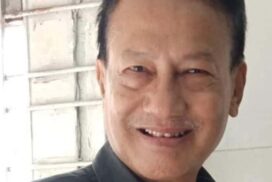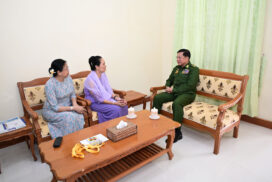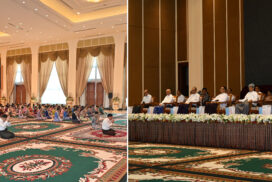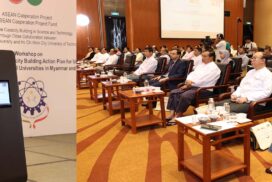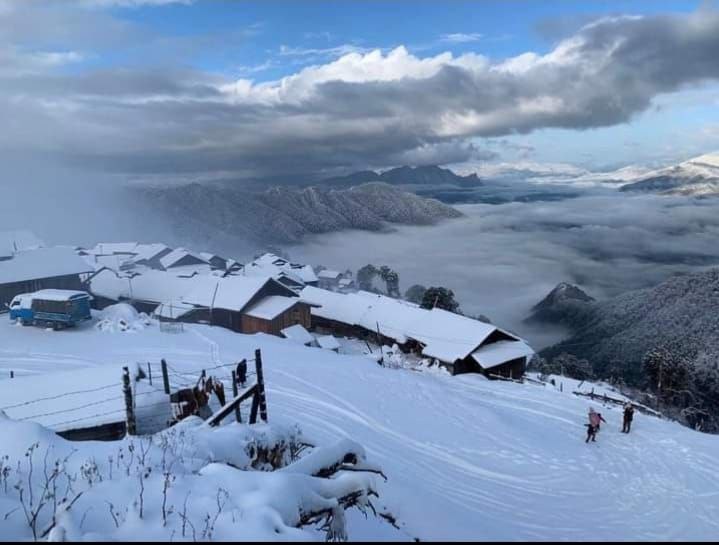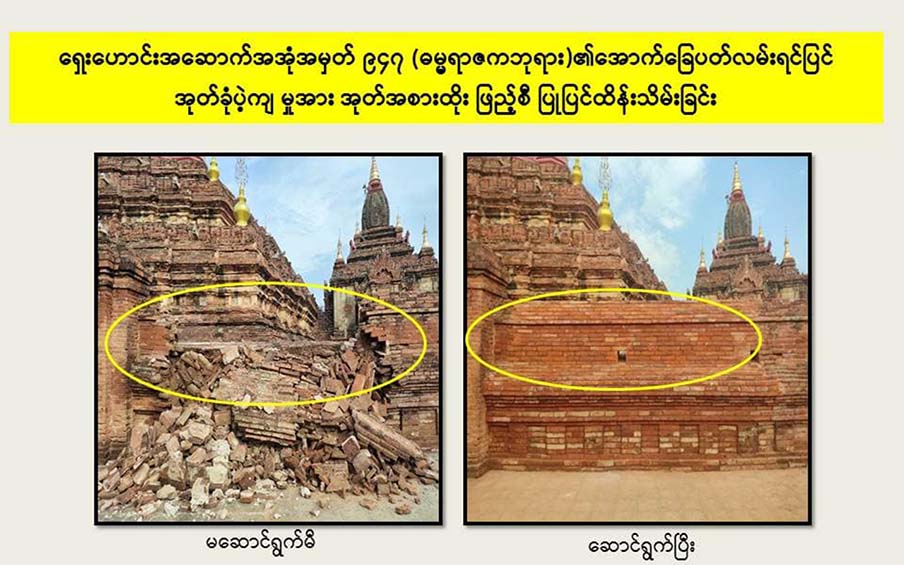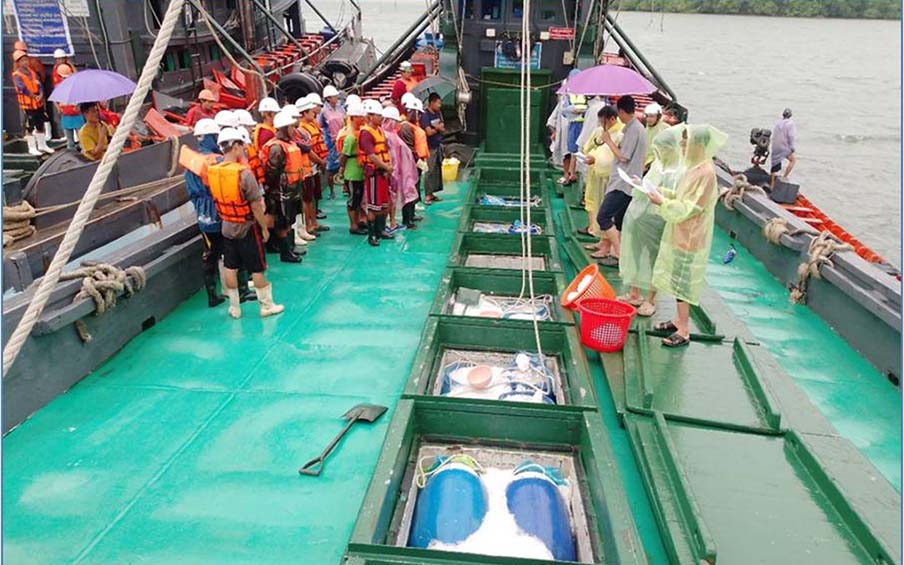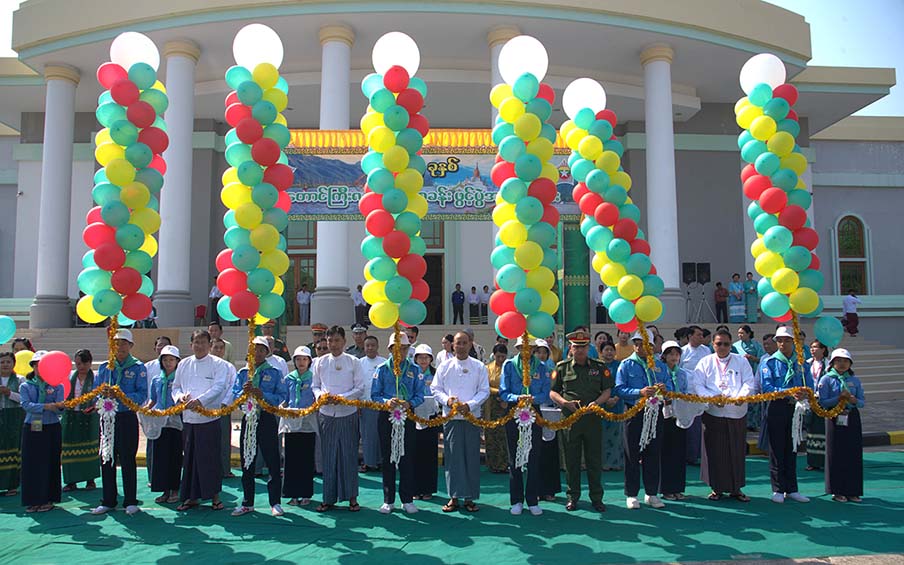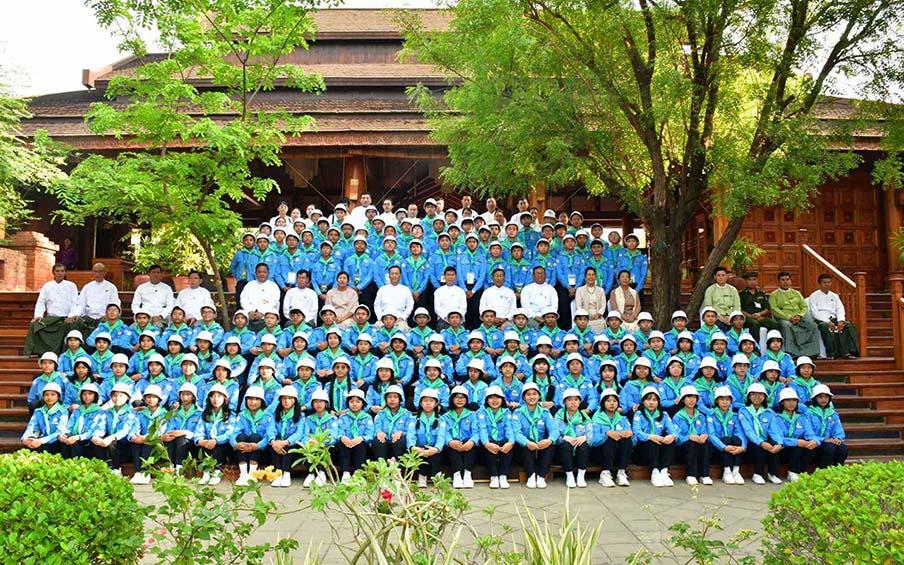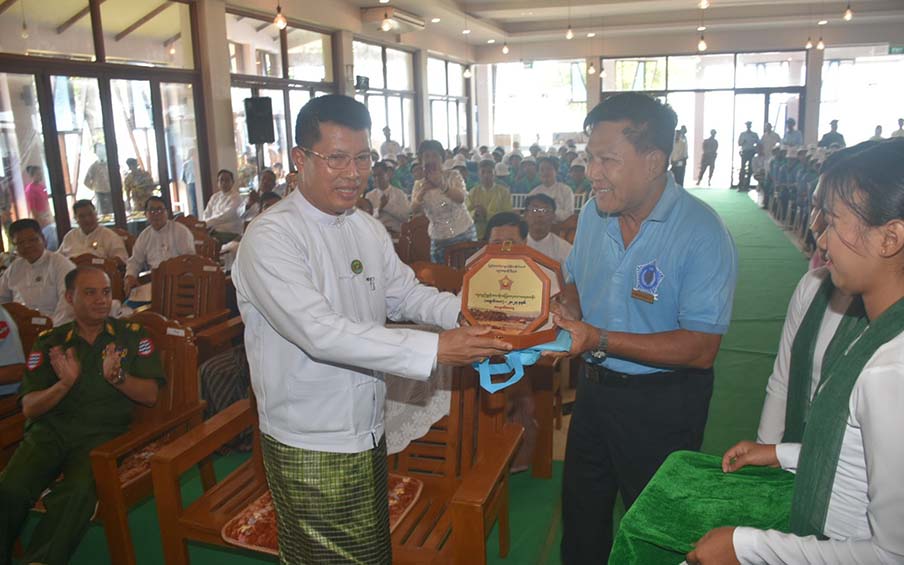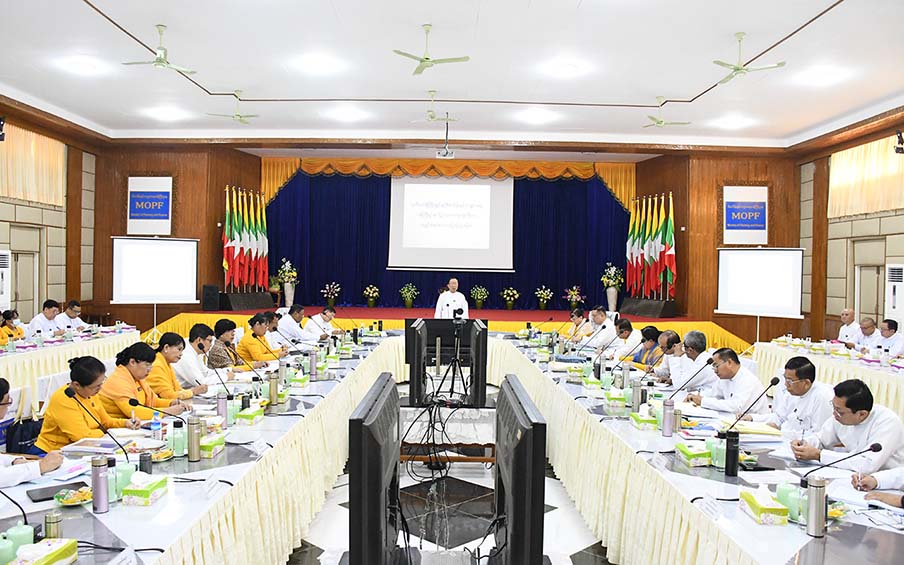The 10th of May 2023 was the 45th anniversary of the passing of scholar Dr Htin Aung (18 May 1909-10 May 1978). Among many others, Dr Htin Aung was Vice-Chancellor of the University of Rangoon and he had about ten earned University degrees from distinguished Universities abroad.
‘A Conversation with Princess Learned in the Law’ and the People’s Judicial System (of August 1972 to September 1988)
The youngest of the four brothers from a distinguished family who were all Barristers from the Inns of Court of the United Kingdom the fourth brother Dr Htin Aung also had many degrees in law.
In the 28 and 29 March 1974 issues of The Working People’s Daily (WPD) Dr Htin Aung published an article in two parts ‘A Conversation with Princess-Learned-in-the-Law’) Parts I and Part II (hereafter WPD article). In all other published articles and books Dr Htin Aung simply used in his by-lines ‘Maung (Mg) Htin Aung’. But in the above article published the byline reads ‘Mg Htin Aung, LL.M. (London), LL.B. (Cambridge), B.C.L (Oxford), LL.D. (Dublin), Barrister-at-Law’. The mention of all of his degrees (albeit only in the law field), one submits, was deliberate and with intended irony. Implementing the imprimatur of the then paramount leader U Ne Win (6 July 1910-5 December 2002) then Judicial Minister Dr Maung Maung (31 January 1925-2 July 1994) put into effect the so-called ‘People’s judicial system’ starting on 7 August 1972 where almost all of the professional judges with the exception of the apex court were sacked and ‘people’s judges’ were appointed. Dr Htin Aung stated in Part I of the above article that less than 10% (emphasis in original) of the People’s Judges had legal qualifications. This writer would add that an overwhelming majority of the people’s judges were mainly cadres from the sole ruling Burma Socialist Programme Party. Dr Htin Aung mentioning all his law degrees in the by-line is an ironic slide to the stifling, total political control of the judiciary at the time ‘People’s judicial system’ was published.
When I met Sayagyi Dr Htin Aung in 1974 I enquired what the acronym of ‘B.C.L.’ meant. Dr Htin Aung replied that it meant ‘Bachelor of Civil Laws’ and it covered mainly Roman laws and that he was the only person in Burma who had a Bachelor of Civil Law degree.
Aspiring to specialize in history but initially specializing in English and Comparative Literature
Dr Htin Aung had initially wanted to specialize in (Burmese) history but then the young student Maung Htin Aung in the mid-1920s at Rangoon University disagreed- and apparently even made fun of the colonialist slant of the then new history Lecturer D. G. E Hall (17 November 1891-12 October 1979) on aspects of pre-colonial Burmese history. So Maung Htin Aung, in order to avoid a possible clash (so to speak) with Hall, decided to specialise for his honours and post-graduate studies in literature (comparative Burmese and English literature). Indeed, one of his early doctorates from the University of Dublin deals with comparative Elizabethan and mainly 19th-century Burmese drama and parts of his doctoral thesis were published as Burmese Drama (first published in 1937, republished in 1957 by Oxford University Press).
Anthropological study of Folk Elements in Burmese Buddhism and debunking the ‘conceit’ that the Ari monks were ‘super-villains’
Sayagyi Dr Htin Aung’s Folk Elements in Burmese Buddhism (1962) can be designated as an anthropological study of the subject. As early as the mid-1950s Dr Htin Aung had pointed out that the Ari monks in the Pagan (Bagan) era were (to put it blandly) not as bad as the Burmese chronicles stated that they were.
In the latter part of his academic career starting from the early 1960s Dr Htin Aung focussed most of his research work and scholarly publications, in his own words, to scrap ‘the slime of slander and mud of misrepresentation from the ruby stone of Burmese history’ (WPD article, 28 March 1974). Still, perhaps centuries before the British colonialist historians ‘muddied misrepresentation’ of ‘the ruby stone of Burmese history’ it was mainly if not exclusively the Burmese historians or chroniclers who had ‘muddied’ the Ari monks.
And he also published another two-part article in 26 and 27 (or 27 and 28) September 1974 issues of the WPD titled ‘A libellous myth against the Burmese chronicles’ where the last sentence of the article (from my recollection) was ‘ … there are but a few holes, in the libellous curtain of myths against the Burmese chronicles and when I am dead there will be none for though my books remain dust-covered and forgotten in library shelves, edition after edition of Shwe Yoe (pseudonym for Sir James Scott), (DGE) Hall and (GE) Harvey would come out and they would cover up the holes’.
Shwe Yoe/Shway Yoe (25 December 1861-4 April 1935) wrote The Burman: His Life and Notions, first published in 1882 was republished several times. History of Burma from the Earliest Times to 10 March 1824 the beginning of the British Conquest by G E Harvey (1889-1965) was first published in 1925 and was republished, perhaps with revisions- as recently as 2019. A search on the internet reveals that none of the following books by Dr Htin Aung concerning Burmese history was republished: A History of Burma (Columbia University Press, 1967), Burmese history before 1287: A defence of the chronicles (Asoka Society, Oxford 1970) Lord Randolph Churchill and the dancing peacock, British conquest of Burma 1885 (Manohar publications, India, 1990). The last book was published posthumously more than 11 years after Dr Htin Aung’s demise.
‘In my own right as a historian’ versus ‘He was no historian’
A year or two after the above article in March 1974 WPD Dr Htin Aung, in another article in the WPD, wrote the phrase ‘in my own right as a historian’. Fast forward about 25 years into the future. This writer has heard (so it is emphasized that it is hearsay) through the late U Thet Tun former Burmese Ambassador to France that in a seminar held in Yangon apparently in the late 1990s a foreign scholar asked the late (historian) Dr Than Tun (6 April 1923-30 November 2005) ‘What do you think of Dr Htin Aung as a historian? Dr Than Tun replied ‘He was no historian’!
In this writer’s humble opinion, Sayagyi Dr Than Tun probably had the advantage of doing extensive historical fieldwork for a few decades whereas Sayagyi Dr Htin Aung did not have the full opportunity to do so. Dr Htin Aung wrote most of his books on Burmese history when he was abroad in the early to late 1960s as a visiting scholar at Universities in the United States and the United Kingdom. Dr Than Tun eschewed references to the chronicles to a very large extent and his primary sources were contemporaneous stone inscriptions. Dr Than Tun also stated to the effect that historians should not be too much influenced by ‘nationalism’. These factors might have been the reasons for Dr Than Tun’s apparent and blunt statement that his elder colleague was ‘no historian’.
In a different discipline, this writer is reminded of another story (not apocryphal but actual) narrated by the late Martin Gardner in his book The Whys of a Philosopher Scrivener. Gardner wrote that in 1980 he saw on Cable News Network (CNN) an interview conducted by the late Larry King interviewing the late right-wing economist Milton Friedman. Friedman told Larry King to the effect that ‘economists agree on basic things and their disagreements, if any, are minor’. Gardner reported that an astonished Larry King asked Friedman ‘Do you mean to say that you (Friedman) and (liberal economist) John Kenneth Galbraith (15 October 1908-29 April 2006) has no differences?’. Replied Friedman ‘Oh I thought you were talking about economists’.
From economists to historians, some scholars may have fixed views as to who or what tenets should the economists or historians adhere to or what methodology they should adopt in researching, writing about and espousing their views and assertions related to their disciplines.
Dr Htin Aung’s last days and my unpublished tribute
After his return to Burma from a long stay abroad from 1959 to 1972 Dr Htin Aung semi-regularly contributed his articles to The Working People’s Daily. He also contributed articles to the now defunct Journal of Burma Research Society (The then paramount leader U Ne Win, in December 1980, ordered both the Society and the Journal to ‘close shop’ stating that they were ‘colonial creations’. Dr Htin Aung was, in his own way, an anti-colonialist. What would he have said to U Ne Win’s reason for disbanding the Burma Research Society and closing the Journal?)
In May 1978 Dr Htin Aung was about to leave for (then) West Germany to attend a conference when he suddenly passed away.
The widow of Dr Htin Aung the late Daw Tin Hla told me that when she tried to insert a paid obituary notice of Sithu Dr Htin Aung in The Guardian she learned that an editorial board meeting was convened to consider whether or not to publish the paid obituary notice before being allowed to be published!
Forty-five years ago, in May 1978, after I learned of Sayagyi’s demise I sent my hand-written tribute to The Guardian (Rangoon) newspaper. In paraphrasing Dr Htin Aung’s own tribute to ‘my lord Kanaung’ (Crown Prince Kanaung, 31 January 1820-2 August 1866), who was assassinated, I wrote that Sayagyi’s death likewise left us ‘bereaved and bereft’. It was not published. In retrospect I should have sent it to the WPD for Dr Htin Aung published the bulk (if not all) of his journalistic articles in the WPD. A few weeks later the ‘Third brother’, Dr Htin Aung’s elder brother former Chief Justice U Myint Thein (22 February 1900-3 October 1994) wrote to me: ‘Your article on your Saya Htin Aung did not, as you have written, “saw the light of day”’.
Through this belated tribute, I paid my respects to Saya Htin Aung’s memory and commemorate his achievements and contributions.

